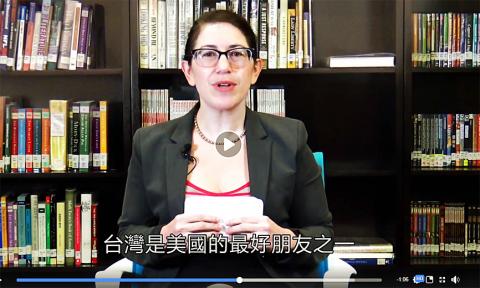The US Senate on Wednesday unanimously passed the Taiwan Allies International Protection and Enhancement Initiative (TAIPEI) Act, designed to help Taiwan stabilize diplomatic ties, which awaits US President Donald Trump’s signature to take effect.
The passage came just one week after the legislation unanimously cleared the US House of Representatives on Wednesday last week.
First introduced in the Senate in May last year by Cory Gardner, with US Representative John Curtis proposing a similar version in the US House in October, the bill is aimed at showing US support for Taiwan’s diplomatic alliances around the world amid growing pressure from Beijing.
The bill authorizes the US Department of State to consider “reducing its economic, security and diplomatic engagements with nations that take serious or significant actions to undermine Taiwan.”
It also calls on Washington to help Taiwan gain participation in international organizations, either as a member or an observer, and shows support for Taiwan’s international participation when it interacts with Beijing.
US legislative procedure requires a proposed law passed by Congress be presented to the president, who then has 10 days to approve or disapprove it.
Normally, bills not signed or vetoed within 10 days become law, even without Trump’s signature.
The bill’s passage at the US Senate shows that Taiwan-US ties are growing closer, Legislative Speaker You Si-kun (游錫堃) said on Facebook yesterday, thanking the US Congress and Americans.
In related news, American Institute in Taiwan spokeswoman Amanda Mansour said that Taiwan is one of the US’ best friends and most important partners, and the US’ Taiwan Relations Act, which took effect in 1979, was designed to promote close collaboration and communication between the US and Taiwan.
Mansour, speaking in Mandarin in a video clip posted on Facebook on Tuesday, was answering online questions about why the US has not established formal relations with Taiwan.
“We think that maintaining the ‘status quo’ has brought about peace and prosperity across the Taiwan Strait over the past 40 years,” she said. “Any attempt to change the ‘status quo’ will threaten the stability.”
While current Taiwan-US ties are imperfect, they are the best in history, she said, adding that bilateral relations are “real friends” making “real progress.”
The US switched diplomatic relations from Taipei to Beijing in 1979, leading many other nations to cut ties with Taiwan.
Taiwan now has 15 diplomatic allies.
Source: Taipei Times - 2020/03/13





















